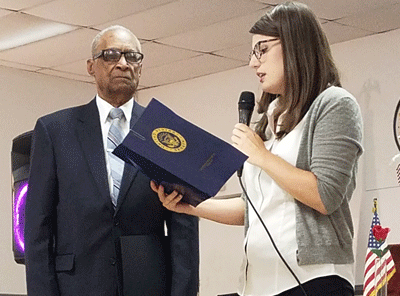Even though Annapolis is well known for celebrating African-American heritage and historic neighborhoods, there are many stories of historical significance that remain untold. One local man, James Diggs’ military story is just one those gems that should be firmly cemented in historical repositories.
On September 20, 2019, National POW/MIA (prisoners of war/ missing in action) Recognition Day, Diggs took a step in this much-deserved direction, with the help of the American Legion Cook-Pinkney Post 141’s commander, Curtis Jones. Diggs publicly shared his story about being held as a POW for 33 months during the Korean War.
The Library of Congress’s Veterans History Project (VHP) recorded the interview at the post.
Congress created the VHP in 2000 to preserve interviews, letters, maps, original photographs and other historical documents belonging to United States military veterans from World War I to the present, according to the VHP website.
“If you’re not familiar with that (VHP), it’s an oral history archive at The Library of Congress where we preserve and keep the memories alive of veterans,” said Andrew Huber, Liaison Specialist for the VHP. “This is something the historians can learn from when people are writing books, making movies, filming documentaries, so they can get factual information about our nation’s heroes, and we thank Mr. Diggs very much for participating.”
The evening also included a dinner and music, and citations were presented to Diggs.
Jones, who is a retired Marine said that Diggs was honored to let him know that the people in his community are grateful for his service to this nation. He further explained that history books primarily show Caucasian POWs when referencing the Korean War.
“That would make you think that there were no black soldiers during that time. After meeting Mr. Diggs over 20 years ago, and after getting to know him and just listening to this soft spoken man, I asked him one day what did he do in the war, and he told me he had been a POW for almost three years!” Jones explained. “He told me about the day that he was captured and how he thought that would be his last day on earth! I asked him how did he make it, and he told me faith in God. That day, I knew that I had to do something to make sure that his story would live on in the history of this country, and that he received his just due [so] that he and his comrades [would] not be forgotten anymore.”
After completing the VHP’s interview in a quiet space, Diggs who is now in his eighties emerged and he received a host of accolades. He expressed his gratitude for being honored.
”Through Him, and through Him alone, brought me this far, I hope to continue on this day and road in the future, and I want to thank all of you for being here tonight,” Diggs said.
Diggs lived to tell his miraculous story but there are many other stories related to serving in the military which should never slip away, including oral histories from Gold Star Families who can share their stories on behalf of military members who died as a result of service. Any veteran may submit an interview to be added to the repository. It takes six to eight months for interviews to be processed and added to collections.
Diggs’s interview has been selected to be digitized and will be available online. However, some stories are only available for viewing in the American Folklife Center (AFC) Reading Room in the Library’s Jefferson Building. The center is located in Washington, D.C.
“If you all are interested in his (Diggs’s) story, you can go to: www.loc.gov/vets. In a little while, we’ll have it posted, and you’ll be able to listen to his full story, but I encourage any veteran who is here tonight to also share their story. Because, while [Mr. Diggs] is an absolute hero, he’s only one veteran out of the 22 million living veterans in America today— and every single one of them has an important story,” Huber said. “And no matter what you did, what branch you served in, whether you deployed or not, your story is important and your story matters to America. So we hope all of you who are veterans or who know veterans will look up the Library of Congress Veterans History Project and get involved.”
Jones reaffirmed these points, when he added that he would like children to ask relatives if they served in the military.
“If the answer is ‘yes,’ ask “What did they do?’” Jones said. “So much history is being lost because children don’t know what’s right in front of them.”
